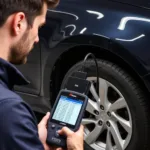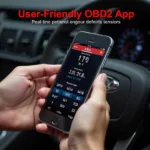Many car enthusiasts and owners of older vehicles often wonder about the possibility of converting their OBD1 systems to the more modern OBD2 system. While it might seem like a simple plug-and-play upgrade, the reality is far more nuanced. Let’s delve into the intricacies of OBD1 and OBD2 systems and explore the feasibility of conversion.
Understanding the Difference: OBD1 vs. OBD2
Before we dive into the conversion aspect, it’s crucial to grasp the fundamental differences between OBD1 and OBD2 systems.
OBD1, or On-Board Diagnostics generation 1, was the initial standard for vehicle diagnostics implemented in the early 1990s. This system relied on manufacturer-specific connectors and protocols, leading to a lack of standardization across different car makes and models. OBD1 primarily focused on monitoring the engine and emissions control systems.
OBD2, introduced in 1996, brought uniformity and advancement to vehicle diagnostics. It mandated a standardized 16-pin connector and communication protocol, making it universally compatible with all car models from 1996 onwards. OBD2 expanded its diagnostic scope beyond the engine, encompassing other critical systems like transmission, airbags, and anti-lock brakes.
Can You Convert OBD1 to OBD2?
The short answer is: it’s complicated. Converting an OBD1 system to OBD2 isn’t a simple plug-and-play affair. It often involves significant modifications that can vary greatly depending on the car’s make, model, and year.
Here’s why a direct conversion is challenging:
- Different ECU and Wiring: OBD1 and OBD2 systems utilize different Engine Control Units (ECUs) and wiring harnesses. Converting would necessitate replacing the entire ECU and rewiring the car’s electrical system, a complex and costly endeavor.
- Sensor Compatibility: OBD2 relies on a broader range of sensors than OBD1, many of which are not present in older vehicles. A conversion would require installing these additional sensors, further adding to the complexity.
- Emissions Standards: OBD2 was introduced to meet stricter emission regulations. Converting an OBD1 system to meet these standards might involve significant modifications to the car’s exhaust system and other components.
Alternatives to Full Conversion
While a complete conversion might not be feasible or cost-effective, several alternatives offer some benefits of OBD2 diagnostics for older vehicles:
- Aftermarket OBD2 Scanners with OBD1 Adapters: Some aftermarket OBD2 scanners come with adapters compatible with certain OBD1 systems. These adapters allow you to connect your scanner to your OBD1 car and access basic engine diagnostics. However, the functionality might be limited compared to a full OBD2 system.
“Using an OBD2 scanner with an OBD1 adapter is a practical approach for accessing basic engine diagnostics on older cars,” says John Miller, a seasoned automotive engineer with over 20 years of experience. “While not a complete replacement for OBD2, it’s a valuable tool for troubleshooting common engine issues.”
 OBD2 Scanner with OBD1 Adapter
OBD2 Scanner with OBD1 Adapter
- Standalone Engine Management Systems: For extensive modifications or performance tuning, consider installing a standalone engine management system. These systems replace the factory ECU and offer advanced features like data logging, tuning capabilities, and OBD2 compatibility.
Making the Right Choice
Deciding whether to attempt an OBD1 to OBD2 conversion or explore alternatives hinges on various factors:
- Car Make and Model: Some car models might have readily available conversion kits or aftermarket ECUs that simplify the process.
- Budget: Conversions can be expensive, factoring in parts, labor, and potential compatibility issues.
- Technical Expertise: Converting an OBD1 system demands a high level of mechanical and electrical expertise.
Before embarking on any modifications, thoroughly research your specific car model, consult with experienced mechanics specializing in OBD systems, and carefully weigh the costs and benefits.
Conclusion
Converting an OBD1 system to OBD2 is a complex undertaking often fraught with challenges. While not impossible, it requires significant modifications, expertise, and expenses. Evaluating alternatives like OBD2 scanners with adapters or standalone engine management systems might offer a more practical approach for accessing advanced diagnostics and functionalities for your older vehicle.
FAQs about OBD1 to OBD2 Conversion
1. Can I convert my 1994 car to OBD2?
Cars manufactured before 1996 typically have OBD1 systems. Converting them to OBD2 is possible but involves extensive modifications and might not be cost-effective.
2. Are there any plug-and-play OBD1 to OBD2 conversion kits available?
While some kits claim to offer plug-and-play conversions, they often come with limitations and might not be truly universal. It’s crucial to research thoroughly and consult with experts before investing in such kits.
3. Will converting to OBD2 improve my car’s performance?
Converting to OBD2 alone won’t necessarily boost performance. However, it might allow you to use aftermarket tuning software and diagnostics tools that can help optimize engine performance.
4. What are the benefits of having an OBD2 system?
OBD2 offers standardized diagnostics, enabling easier troubleshooting, access to more data points, and compatibility with a wider range of scanners and software.
5. Can I convert my car’s OBD system myself?
Converting an OBD system is a complex task that requires advanced mechanical and electrical skills. It’s highly recommended to seek professional assistance from experienced mechanics.
Need Help With Your Car’s Diagnostic System?
We understand that navigating the complexities of OBD systems can be challenging. If you have any questions or require assistance with your car’s diagnostics, our team of experts is here to help.
Contact us via WhatsApp: +1(641)206-8880 or Email: [email protected]. Our dedicated customer support team is available 24/7 to provide personalized assistance and address your concerns.

